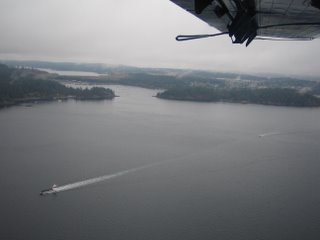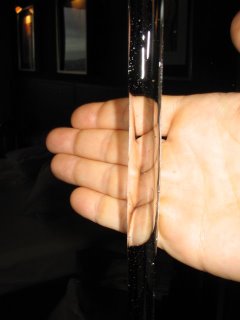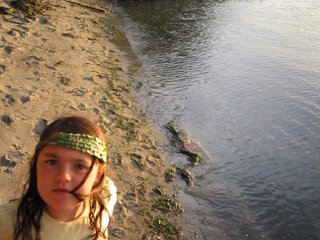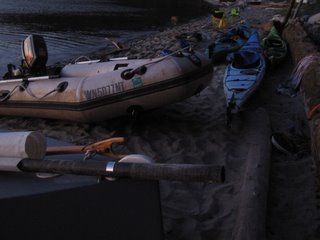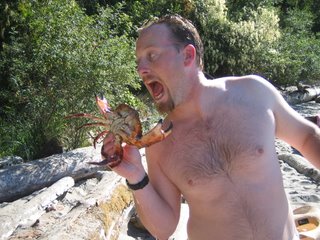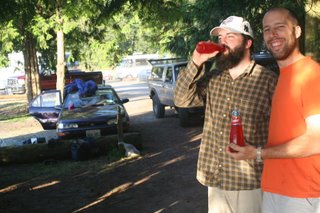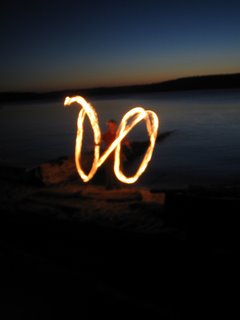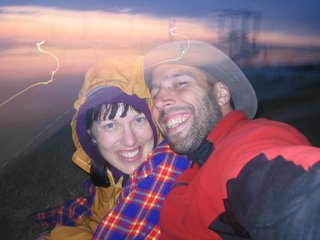Saturday morning dawned early and gray, actually, which was a relief after two days of intense sun. A bit groggy from our pirate-laced sleep, we all took our time stumbling around camp and no one, I will say, leapt into a boat to take advantage of the cool morning stillness. Laura and Sonja made some Cream of Wheat (not so well received, or not so universally received, as their pasta and Kate’s salad of the night before, which I forgot to rave about in my disgruntlement at pirates), and Mario and Mia rounded out our morning meal with breakfast burritos. Deane and Erika paddled off soon after, headed to Manchester across the channel in search of more camp stove fuel and un-iodined water. The Puppies tumbled out of their tent and milled about eating cereal and burritos, Laela found the bow and arrow and quiver she’d fashioned the first afternoon from flotsam on the beach and tacked from person to person, threatening to shoot us (we were in no real danger, as you might imagine). The ranger came by on his morning rounds and we pulled him aside to complain about the pirates. He was sorry to hear that we’d had trouble, and had thought himself on his 9:30pm tour around the island in his skiff, that the boat looked like potential trouble. They were fairly quiet then, though—not enough use yet of the beer bong, I expect—and so he’d gone on his way. He informed us that in the future it was perfectly reasonable to call 911 and they would call his direct line, or send over a sheriff. He then asked if we happened to know if any of the boaters happened to be on shore. Mia pointed behind us, to where a very pirate-looking man, tan with a ponytail and earrings, was standing at the base of our sandstone cliff, watching his 8-year-old son clamber about. Oh. So that’s who that was.
Our friend the ranger took the man aside, and evidently asked him to leave; the boat sailed less than an hour later.
At noon a group of us decided to paddle over to Manchester dock to see what kind of water/ice cream options were available to us on that shore (Butterfinger bars and Aquafina); back in camp we met up with Deane and Erika, who’d traveled many miles south along the peninsula until they found more gas for our stoves. Some swimming took place, some naps, some lunches of sandwiches, some drinks of filtered water. Some catch with two of the Puppies and Deane, for at least 45 minutes, waist deep in the 45 degree water.
In the late afternoon, Laura, Sonja, Deane, Erika, the Puppies and I all decided to walk the long southern route around the island to get some ice cream and see the sights. The one thing about kayaking is that your legs are pretty much useless except as ballast and a little for stability, but they don’t get to work much (except in this kind of kayak, which we didn’t have). I generally find that I need to run, really run, for at least a little bit as soon as I’m on land. So the long (3.3 miles total) loop trail is perfect.
On the way home, after we’d drunk them out of fresh strawberry milkshakes and I’d enjoyed—very, very much I will say—my chocolate rootbeer float, we took turns “skipping” each other, to everyone’s entertainment.
This is something Ian and I discovered in late winter when we had an urge for ice cream and decided to walk rather than drive down to Fremont. Walking took too long, so we started to skip, and then we had a brilliant idea. Basically, two people start skipping arm in arm. On a particular skip, pre-arranged or not, the person whose arm is below flings the person whose arm is above straight up while skipping up. The result is an unexpected loss of gravity for the person who’s being flung, which is hysterically funny. The problem with doing this with only two people is that the flungee is inevitably flung a little to the side. Generally, this isn’t too much of a problem; when I introduced Deane to the concept, I managed to launch him only enough to lift him a little and surprise him into schoolgirl giggles. When he returned the favor, however, he launched me so hard I flew into the scrub on the side of the path (which surprised me, and then him, into hearty guffaws). Having one person on either side, though, you get more lift and more stability. And so, everyone was skipped, and we arrived back in camp breathless and laughing and all talking at once to everyone who was already there.
“Wait, you guys,” said Mia, breaking in. “There’s something going on down the beach—some people just came up in a ski boat and they’re calling for help. Someone passed out or something?”
I gazed down the beach and my heart did a little flip. Sure enough, the activity of the multitudes of other campers who’d come to stay throughout the weekend, living up to kayak man’s predictions of a full campground, was tinged a frantic yellow. I started down the beach, just behind Laura who called out “I know CPR! I’m certified in CPR!”. We waved the ski boat in toward shore and started out to it. “Do you want me to come?” I asked Laura. “Yes,” she replied.
As we reached the stern of the speed boat, I called up to the driver, who was clearly freaked out, to put it in neutral. He cut the engine and I climbed up on the swim platform and helped Laura up after me. “Okay!” I called as we tumbled on board. As we headed out to the buoys, Laura started asking questions. “Is it a relative of yours?” No. “Has she been drinking?” They didn’t know. “How long has she been down?”
We docked abruptly next to another ski boat rafted on to the main boat, a 35-40 foot cabin cruiser, and Laura made her way across to the aft where the victim was lying, prone, on the deck. I stayed out of the way and ready to assist in any way I could, in the rafted ski boat, with the owner of that boat, who appeared to be either a friend or relative of the victim.
I sat quietly in the gorgeous, golden-glowing evening sun, rocking gently on the water, and listened to the activity flow around me. First Laura’s voice, calmly repeating her questions. Then a sister, or a friend, of the victim, on the phone with 911 on the deck just above my head, repeating instructions. “They say 15 compressions then one breath, then 15 compressions then one breath,” and into the phone, “it looks like there’s some air in her stomach. Should we try to push that out?”, then back to the people performing CPR “Make sure her head is tilted way back when you give her breaths.” And from someone on deck, “Her color’s better.” and her teenage son, agonizingly, on the phone with the Coast Guard, “WHERE THE FUCK ARE YOU! YOU’RE GOING TO GO HOME TO YOUR MOTHER TONIGHT AND MINE IS GOING TO BE DEAD!”
The park ranger arrived in his skiff with a park nurse, who didn’t have a defibrillator but did have a mobile ECG tester, which kept saying in its mechanical voice “please don’t touch the victim. Testing . . . no pulse. Resume CPR.” The son appeared on the back deck during one of these cycles, and yelled at his dad to let go of his mom. “It doesn’t matter if I die,” said his father. “YES IT DOES!” screamed the boy.
A man arrived who “worked in an ambulance. I’m not a doctor, well, I am, but I’m a psychologist.” A woman, a medic, arrived and managed to get a small bit of steak out. The woman on the phone with 911 announced that an ambulance would be waiting two miles away at Manchester dock, and the ranger let down the bow of his skiff to transfer the victim over. Her husband went with her.
I caught a glimpse of her face as she was moved. She wasn’t alive.
As the skiff left, Laura checked to make sure there were still going to be adults on the boat with the kids, and there were. In the sudden silence, we quietly asked how many kids there were (four—their two children, and two friends), and made sure someone would stay with them, and then the husband of friends rafted on the other side of the boat from where I’d been, who had just arrived for dinner, offered to take us to shore.
Halfway there, a police boat raced by the bay, and caught up with the skiff mid-channel northwest of us, in the path of the setting sun. On shore, Sonja met us with a big hug, and Laura burst into tears. “We can’t stay here,” I said quietly. “Those kids sitting on the bow of their boat . . .”
Maybe 45 minutes later, the man who was not a doctor, well, yes, a psychologist, came putting by in a dinghy. We waded out to him, and he told us that the police boat from Bainbridge had collected a doctor and met the skiff, and they had removed the rest of the steak (why is it always steak?), and restarted her heart. Soon after, the ranger stopped by and confirmed the report, and added that she had blood pressure and was being transferred to the hospital. He took Laura’s name and number, but I doubt if we’ll ever hear more.
I have a lot of thoughts competing for attention—like, how amazing it is that my brother and I had the same childhood and yet my first-hand experience with boats is that there are life-and-death problems on them, and that’s second-hand for him. Or the baffling combination of strength and vulnerability in humans—both the victim, in this case, and those who helped save her life. And fear that she was out too long, that she will never be the same again. And deep sadness that her children, so young, but not young enough to be protected from the knowledge, now understand intimately the fragility of life.
And overall, again, I am reminded of how achingly beautiful consciousness, and experience, and friendship, and love, and nature—and life are. And how precious.
N.B. Laura told me that the instrument the Blake Island nurse brought with her was an AED (automatic external defibrillator). But for some reason--the motion of the boat, the cell phones, or the current state of the woman's heart, it wasn't working.








